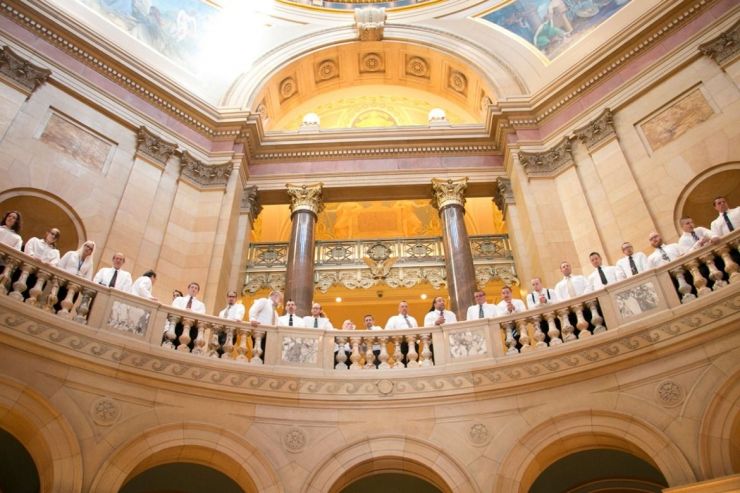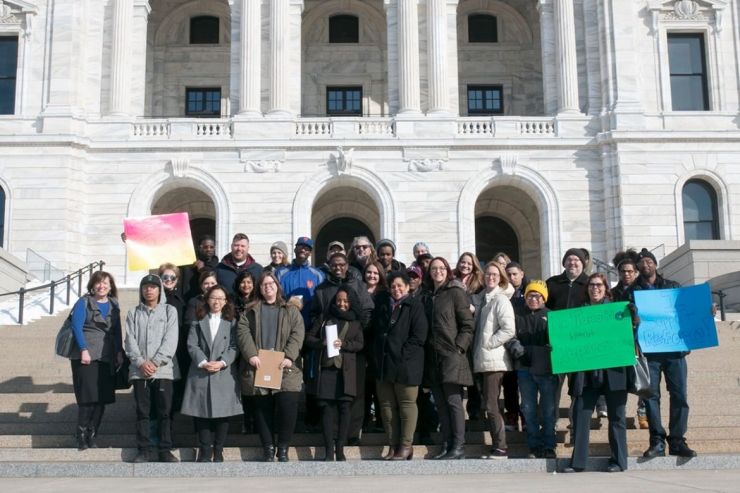See Inside Second Chance Day on the Hill
Every year during Second Chance Day on the Hill, Minnesotans come together to advocate for a fair shot for people with past involvement in the criminal justice system. Last year, 24% of Goodwill-Easter Seals Minnesota program participants cited their criminal history as one of their barriers to finding work. That’s why GESMN tailors its services for people with criminal records — and why we take a leadership role in advocacy around issues that keep them from contributing fully to their communities.
The top legislative priorities for the Minnesota Second Chance Coalition in 2018 are voting restoration (HF 951), and reducing the impact of fines and fees (HF 3356, 3357, 3358) and reducing length of felony probation periods. Sign up for our advocacy email list for alerts on what you can do to support these initiatives.
Keep scrolling for photos of the event, plus excerpts from speakers’ remarks which lend personal context to these legislative issues.
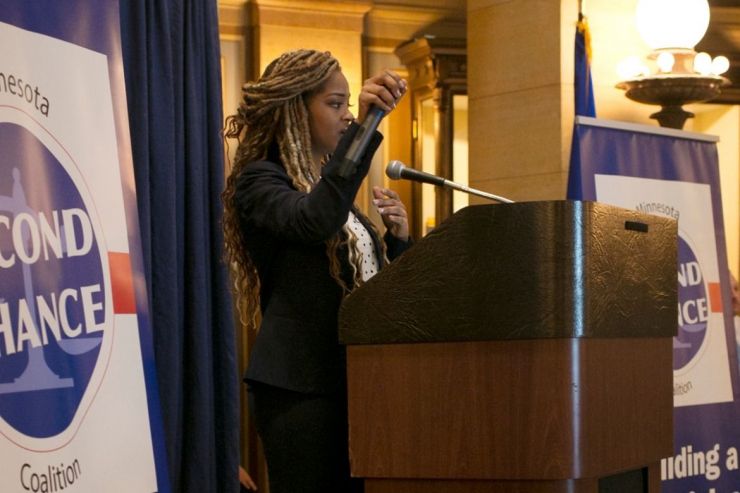
Anika Bowie leads call and response from the podium.
Anika Bowie, Minneapolis NAACP and Restore the Vote Coalition
November 6 is election day, when millions of Americans participate in the driving force of this political engine, casting their ballots in demonstration of an America they are a part of. Because of their votes, “I, too, am America.”
April 16 is Tax Day, when millions of Americans participate in the driving force of this economic engine, filing their taxes in demonstration of an America they are a part of. Because through their taxes, “I, too, am America.”
But do we ever think about those who can’t? Those who pay taxes but can’t vote? Those who labor every week but can’t vote?
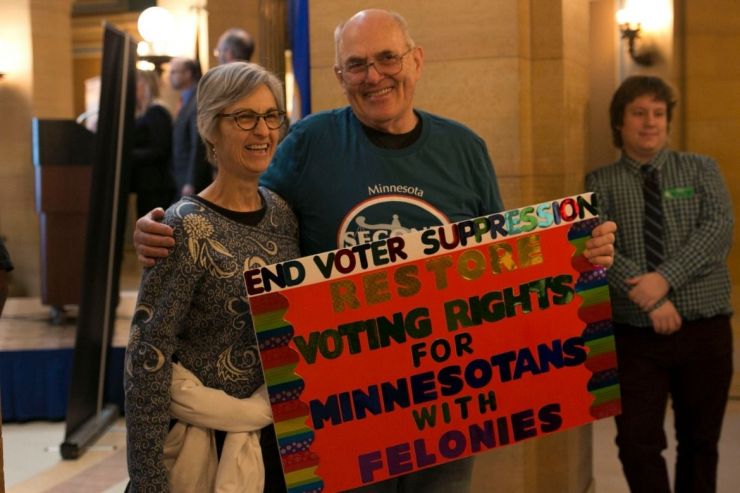
Second Chance Day attendees pose with homemade sign.
Anna Odegaard, Minnesota Asset Building Coalition
As we sit here today, 250,000 Minnesota driver’s licenses are either suspended or revoked. That’s 7.5% of all licenses issued in the state right now. That’s a quarter million people, our neighbors, who can’t legally drive to work, or to the grocery store, or to pick up their kids. That’s not the Minnesota we want.
Most license suspensions aren’t for violations that impact public safety. Many Minnesotans lose their licenses not for dangerous driving but because they couldn’t afford to pay their fines and fees to the courts. Today Minnesota still uses driver’s license suspension as punishment for nonpayment of parking and traffic tickets. That’s a system that punishes people for being poor. And it’s incredibly counterproductive to punish someone for not being able to pay a debt by making it harder for them to get to work, earn their income, support their family and pay their bills.
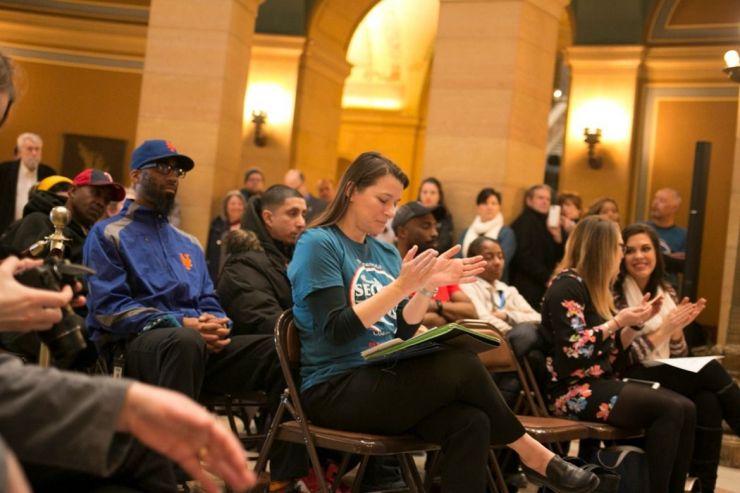
Second Chance Day attendees applaud a speaker.
Leah
In October of 2014, I was taking a left turn at a green light yield. I pulled out into the intersection, like I was taught in driving school. I was waiting for a break in traffic, giving me proper time to make the turn. As the light was turning yellow, the last car sped up instead of slowing down, causing me to have to wait longer. I was not able to complete my turn until the light was turning red.
I was given a ticket for obstructing traffic in an intersection, which cost me $135. I didn’t have the money to pay for this ticket. I didn’t know what the time-frame was, and I didn’t know what the consequences were. The following February I was pulled over, told my license was suspended and was given a driving after suspension ticket that cost me $200 — even though I was never notified of my suspension.
Unable to pay these fines, I received two more driving after suspension tickets, because I still had to drive for work. On one occasion, I was making a bank run as the only manager of a retail store. I had to wait until I had the money to pay off these tickets and ended up using my entire tax return paying off my debt. During this time, I was unable to drive for four months. Because I couldn’t drive, I wasn’t able to fulfill my duties as a store manager, which required me to make deliveries and daily bank runs. If I consistently missed these, I would have lost my job.
My auto insurance company ended up dropping me as a client, and I wasn’t able to find new insurance for less than $1,000 a month, if they accepted me at all. The total cost of these tickets, in addition to the increase to my auto insurance is $13,400 so far. I support these fines and fees campaigns.
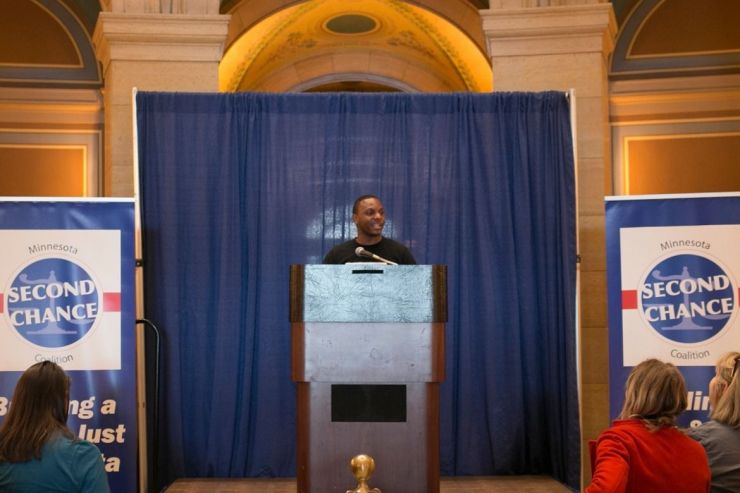
Speaker and consultant Elizer Darris shares his story at the podium.
Elizer Darris
One of my responsibilities with the ACLU was to galvanize the base in order to have them show up to the polls, in order to have them engaged in the political process. The very same political process that right now I can’t vote in. I won’t be able to vote for at least seven more years, but I’m driving thousands of people to the polls. But I can’t vote. I pay taxes, but I can’t vote. I obey and abide by the laws, but I can’t vote. I subject myself and submit myself to this process, and I can’t vote in it.
But I have utter faith that we are going to restore the vote.
